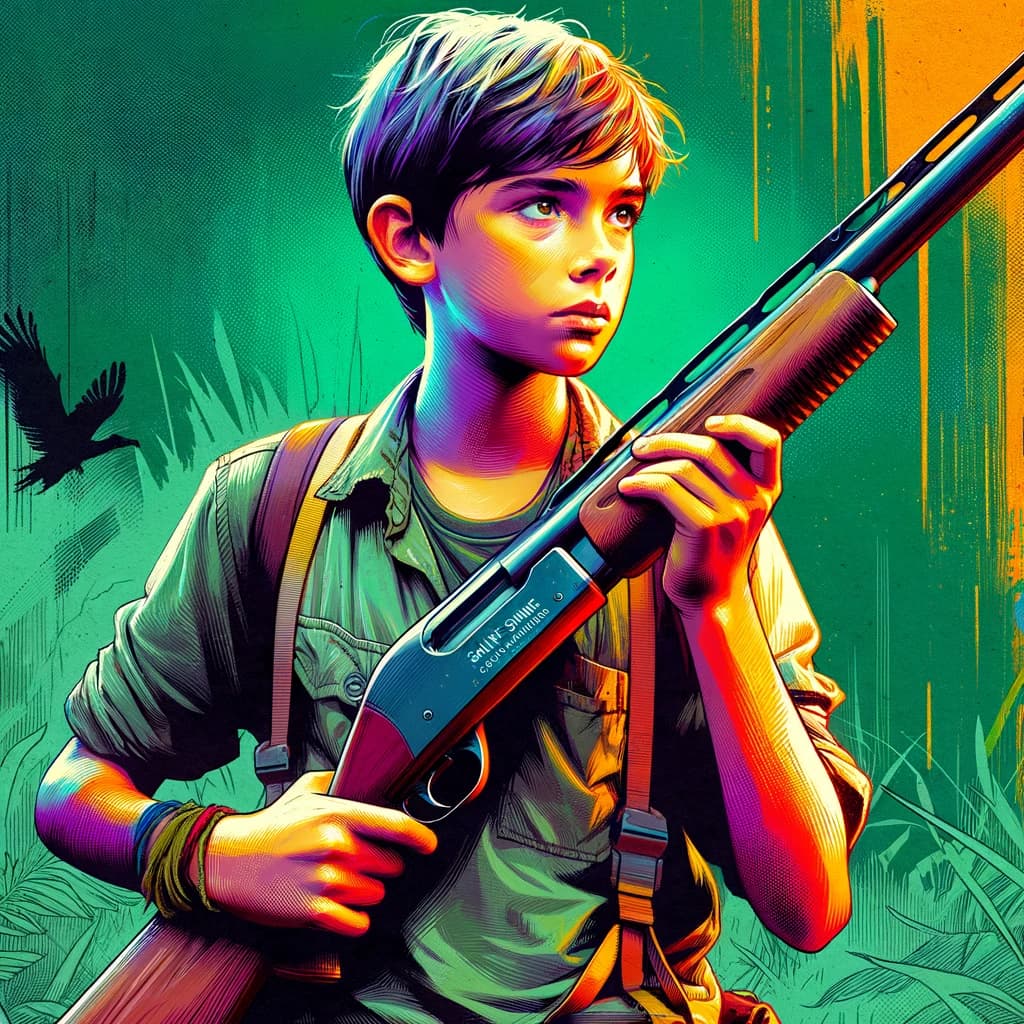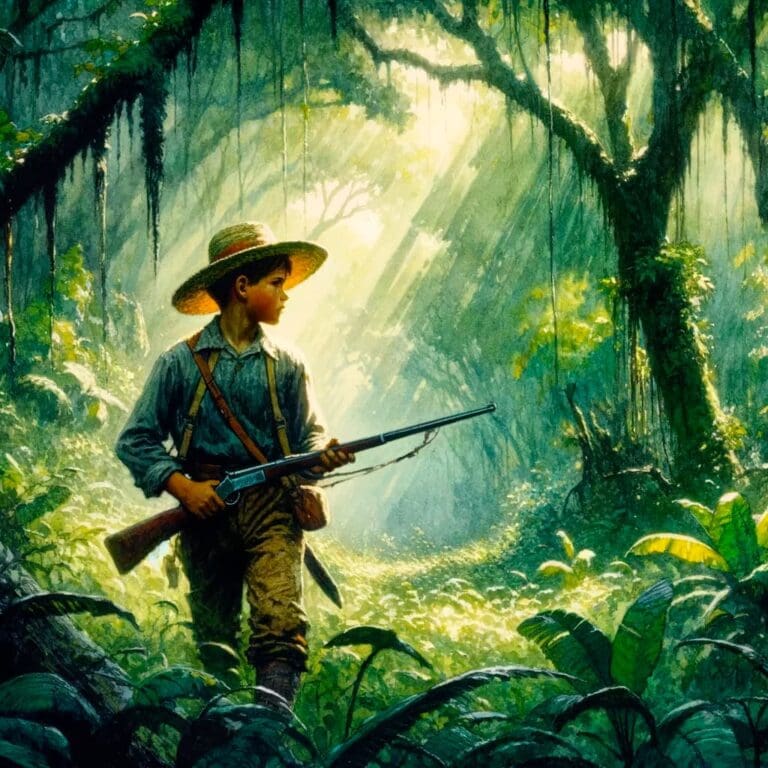"El Hijo" By Quiroga: Summary & Analysis You Need To Know!
Can the weight of a father's love, intertwined with the sharp sting of fear, truly encapsulate the essence of a life? Horacio Quiroga's short story, "El Hijo," masterfully dissects this very question, offering a poignant exploration of paternal instincts and the painful embrace of a child's burgeoning independence.
Published on January 15, 1928, in "La Nacin" and subsequently included in the anthology "Ms all" in 1935, "El Hijo" transports the reader to the lush, yet perilous, environment of Misiones. This setting, with its oppressive heat and vibrant life, acts as a crucial backdrop, profoundly influencing the characters' actions and, ultimately, their destiny. The narrative centers around a widowed father and his thirteen-year-old son, their lives intricately woven into the fabric of the jungle. The story, a testament to Quiroga's ability to blend the personal with the universal, resonates with a raw, emotional power that lingers long after the final word is read.
Heres a glimpse into the life and work of the author, Horacio Quiroga:
- Courtney Palmer Updates Investigations What You Need To Know
- Subaru Commercials Unveiling Ads Actresses More Insights
| Category | Details |
|---|---|
| Full Name | Horacio Silvestre Quiroga Forteza |
| Born | December 31, 1878, in Salto, Uruguay |
| Died | February 19, 1937, in Buenos Aires, Argentina |
| Nationality | Uruguayan |
| Occupation | Short Story Writer, Poet, Playwright |
| Literary Movement | Modernism, Naturalism |
| Notable Works | "Cuentos de la selva" (Tales of the Jungle), "El almohadn de plumas" (The Feather Pillow), "El Hijo" (The Son) |
| Known For | His mastery of the short story genre, his exploration of human nature and the darker aspects of life, his depiction of the natural world. |
| Style | Realism, objectivity, verbal economy, use of vivid imagery. |
| Influences | Edgar Allan Poe, Guy de Maupassant, Rudyard Kipling. |
| Legacy | Considered one of the most important Latin American short story writers. His work continues to be studied and celebrated for its emotional depth, its insightful portrayals of character, and its exploration of the human condition. |
| Website | Britannica |
The narrative unfolds on a sweltering summer morning in Misiones, a time when the sun, heat, and tranquil atmosphere of the season are at their peak. The wilderness, seemingly content with its existence, mirrors the emotional state of the father, who, like the natural world around him, opens his heart to the day. The story's heart beats with the rhythm of the jungle, each rustle of leaves and chirp of a bird adding layers to the unfolding drama.
The son, at thirteen, bids farewell to his father, venturing out to hunt. He receives his fathers instructions and the promise to return by lunchtime. A shot rings out, and the father, engrossed in his tasks, assumes his son has secured a couple of doves. However, as the clock creeps towards noon, the father realizes his son has not returned, and a chilling dread begins to creep in.
Quiroga's storytelling is characterized by realism, objectivity, and a remarkable verbal economy. He meticulously crafts his prose, making every word count. He was deeply influenced by writers like Edgar Allan Poe and Guy de Maupassant, and these influences are evident in the chilling atmosphere and exploration of the darker aspects of human nature found in his work. He once wrote about the art of short story writing in "El Hogar", a literary magazine in Buenos Aires. His style has garnered significant critical acclaim, with many critics pointing to these very strengths. The house of Horacio Quiroga, nestled amidst a sprawling plot of land in Misiones, offers a visual representation of the world he so vividly captured in his stories: on one side, a thick wall of green, and on the other, the mighty Paran River.
- The Thinning Movies Like It Where To Stream Unveiled
- Debora Capobianco More What You Need To Know Now
The study guide delves into the historical, geographical, societal, and cultural contexts of the story. It examines the charactersfather and sonand the key literary devices employed, such as metafiction, desdoblamiento (splitting or doubling), and stream of consciousness. It unravels the complex themes of interpersonal and family relationships, and the construction of reality itself. Furthermore, Quiroga's own personal tragedies often found their way into his narratives, adding a layer of authenticity and emotional depth. This powerful short story skillfully blends the author's personal experiences with his narrative, making it a work that deeply resonates with readers. From the start, the reader forms an emotional bond with the father, and the tension and paternal love portrayed are incredible, leaving a lasting mark on the reader.
The father's journey through the familiar hunting paths, his futile search of the watering holes, underscores a grim certainty: each step forward leads him, inexorably, towards the devastating discovery of his son's lifeless body. Nature, in its enduring indifference, stands witness to this tragedy. "El Hijo" is a brief but powerful story that encapsulates the personal tragedies of the author with his narrative, and as one navigates through the dense jungle of Quiroga's narrative, one cannot help but be affected by the intensity of the paternal love, the fear, and the finality of the loss.
Quiroga's mastery of the short story is evident in his ability to create such a compelling narrative within the confines of a few pages. He was an acclaimed Uruguayan writer who was a master of the short story genre and his exploration of human nature. He evokes a profound sense of place, immersing the reader in the dense and unforgiving jungle environment. The decisions and fate of the characters are heavily influenced by this lush, yet dangerous, setting. Quiroga's genius lies in his ability to capture the raw emotions of his characters, their vulnerability, and their struggle against the forces of nature. This is a story where the sun, the heat, and the calm of the environment become characters themselves, playing a crucial role in the unfolding drama.
The narrative framework is a study in contrasts: the warmth of the Misiones setting juxtaposed with the chill of impending tragedy, the fathers protective instincts clashing with the undeniable reality of his sons burgeoning independence. The exploration of this conflict between love and fear is at the heart of the story, its power residing in its universal resonance: the struggle of a parent to let go, to trust, and to accept the inevitable passage of time and the growth of their child. The fathers world opens up to the wilderness.
The absence of the boy and the father's desperate search are a visceral experience for the reader. Cactus without finding the slightest trace of his son. But nature continues to be still. The story does not shy away from the dark, the painful, and the uncertain. It explores the depths of grief, loss, and the enduring power of a parent's love in the face of unimaginable tragedy. The father has no reproach to make, a lamentable situation.
The house of Horacio Quiroga is a tangible reflection of his literary vision, a world where the line between the natural and the human blurs. This setting becomes an integral character in the narrative. The father's experience and journey represent the essence of human existence, the universal struggle to understand our place in the world and to navigate the complex emotions that define us.



Detail Author:
- Name : Miss Herminia Doyle V
- Username : brady89
- Email : cgoyette@gmail.com
- Birthdate : 2000-06-17
- Address : 364 Cedrick Isle Suite 487 Abernathyhaven, NJ 30426-6162
- Phone : 458-995-4189
- Company : Bayer and Sons
- Job : Pipe Fitter
- Bio : Velit amet voluptas sint voluptatum sunt debitis est. Aperiam impedit et sint. Ea alias autem aspernatur sint tempore.
Socials
linkedin:
- url : https://linkedin.com/in/karina_oberbrunner
- username : karina_oberbrunner
- bio : Aut est culpa qui sequi aut et unde consequatur.
- followers : 1651
- following : 1440
twitter:
- url : https://twitter.com/karina.oberbrunner
- username : karina.oberbrunner
- bio : Aliquam qui laudantium est vitae consequatur maiores eius. Inventore nam quia architecto. Dolor sunt magni sed aperiam nostrum ipsam.
- followers : 6726
- following : 1583